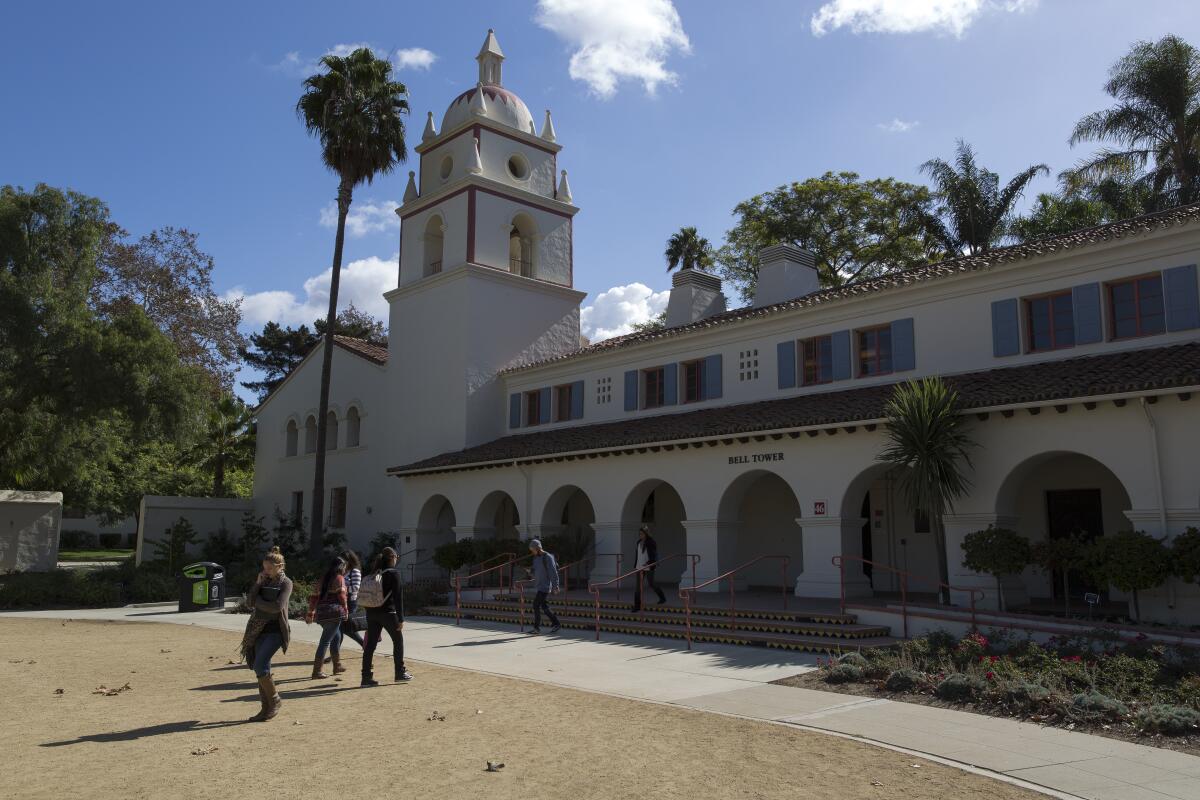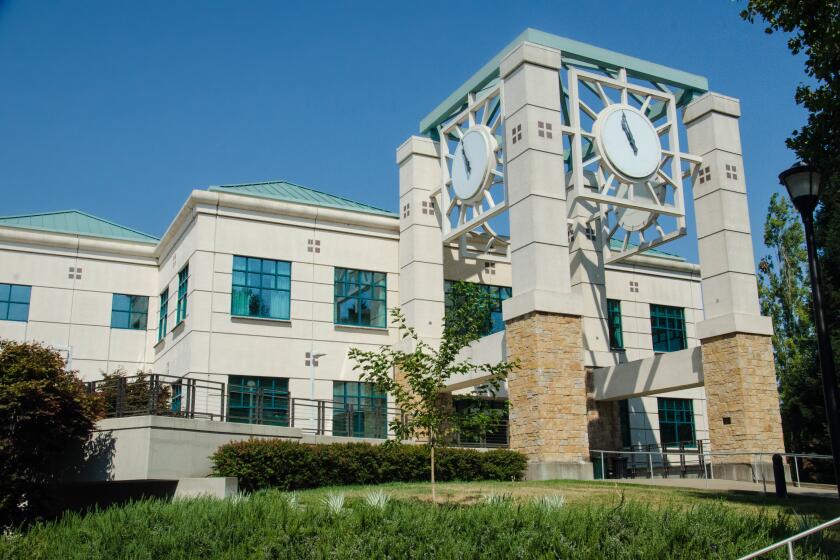A CSU official was accused of harassment. Women question why he wasn’t disciplined

- Share via
Two women who alleged inappropriate behavior by a Cal State vice president said they were dismayed he did not face any discipline or undergo corrective action by Sonoma State President Judy Sakaki after an investigation concluded he engaged in inappropriate touching and made unwanted sexual comments to women while working at another university.
Wm. Gregory Sawyer started at Sonoma State University in 2018, shortly before a woman at Cal State Channel Islands came forward with complaints about his behavior while he was a longtime vice president for student affairs at the Ventura County campus. The woman had been a student worker when she encountered the alleged behavior years prior, according to investigative records released by the university.
Sawyer said he did nothing wrong. The investigation concluded in 2019 that he made inappropriate comments about the appearance of women, gave one woman unwelcome hugs and called another “feisty,” “spicy” and “sassy,” the records show. Channel Islands officials determined that Sawyer’s conduct was unprofessional but did not amount to sexual harassment.
Sakaki communicated her expectations of Sawyer following the investigation, a campus spokesperson said, and told him “he must conduct himself in a manner that would never put his behavior into question.” She later lauded Sawyer in a 2021 letter announcing his retirement, offering a glowing public assessment of his “invaluable leadership” and described him as “a trusted and beloved campus leader who has had a profound impact on the culture of our campus.”
“We are indebted to him for his vision, leadership, and commitment,” she wrote.
A review of hundreds of records reveal inconsistencies in addressing sexual harassment allegations at California State University.
Sakaki has declined to say, through campus or personal spokespeople, whether she has read the investigative reports into the top administrator. She declined Tuesday to comment further about Sawyer, saying it was a confidential personnel matter.
One of the women interviewed as part of the investigation said Sakaki’s response to the findings was especially egregious because Sawyer remained on a CSU campus after he left Channel Islands. The second woman said she viewed Sakaki’s actions as negligent.
“100%, more should have been done. Something should have been discussed — something should have happened,” said Raquel de los Santos, who previously worked for Sawyer. Sakaki “did a disservice to all those students and staff that she needed to protect as president. ... She turned the other way.”
In an email to a Times reporter, Sawyer called the allegations in the investigation “baseless.”
The Times reported that Sakaki signed a legal settlement agreement this year with former Provost Lisa Vollendorf, who reported sexual harassment allegations against the president’s husband, Patrick McCallum, then alleged that Sakaki retaliated against her.
The settlement prepared by California State University cost the university system $600,000, records show. It was finalized weeks before former Chancellor Joseph I. Castro resigned over outcry for his handling of sexual misconduct and bullying allegations against a former vice president when Castro was Fresno State University president.
Recent revelations about how California State University handled sexual harassment and workplace retaliation complaints have rocked the nation’s largest four-year public university system.
The settlement revelations have shaken Sakaki’s leadership of the Northern California campus, prompting a faculty no-confidence vote and calls from two state senators for her to step down. Sakaki spokesman Larry Kamer said Tuesday that “she has no plans at the moment to resign.”
It was unclear whether she would be attending the university’s upcoming commencement — ceremonies she would typically preside over.
Shiwali Patel, director of justice for student survivors and senior counsel for the National Women’s Law Center, said employers sometimes take corrective action even in cases where an accused employee’s behavior falls short of the definition of sexual harassment. Just because someone has moved away from the people who made the complaint doesn’t mean that the conduct will stop, she said.
“People can change, but that doesn’t mean that having one conversation with a president is enough,” Patel said.
A third woman who was interviewed during the investigation and who spoke to The Times on the condition of anonymity said she does not have “confidence in the Title IX process” or believe that CSU has the best interests of complainants or witnesses in mind.
“It’s about protecting the university,” she said, declining to talk specifics about the case.
De los Santos worked as Sawyer’s executive assistant from 2006 to 2010. She told The Times and investigators that Sawyer used to call her his “work wife.” She said he called her after hours and made comments about her appearance. On one occasion, she told investigators and The Times, he reached for her pants to check her size after she mentioned she’d lost weight. On another occasion, he tossed her a Victoria’s Secret catalog and inquired about her lingerie preferences.
“This was before the Me Too movement and I didn’t know how to characterize it,” said De los Santos, who previously filed complaints against Sawyer. “It’s so disgusting and discouraging to know he can get away with that. … He changed the trajectory of my life in a way that has been really difficult.”
Sawyer had spent 16 years at Channel Islands and was a powerful campus figure.
“If you wanted to get anywhere at Channel Islands, you needed to know him,” said another woman who told Channel Islands investigators that Sawyer acted inappropriately and who spoke with The Times on the condition of anonymity.
Sakaki’s letter to the campus community when Sawyer retired upset her, she said, but she wasn’t surprised; he hadn’t been held accountable for his actions before, she said.
“Here we go again,” she said.
More to Read
Sign up for Essential California
The most important California stories and recommendations in your inbox every morning.
You may occasionally receive promotional content from the Los Angeles Times.

















